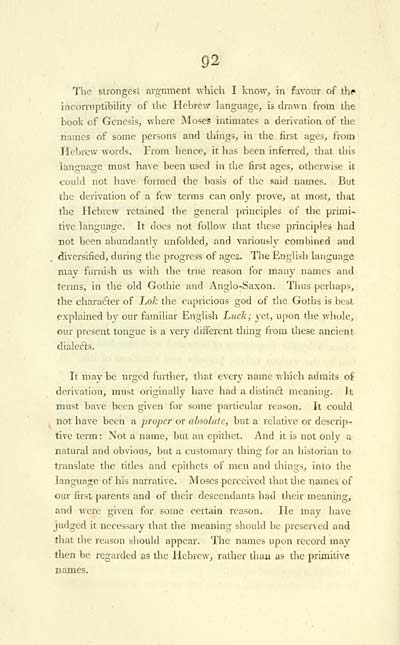Blair Collection > Celtic researches, on the origin, traditions & language, of the ancient Britons
(182)
Download files
Complete book:
Individual page:
Thumbnail gallery: Grid view | List view

92
The strongest argument which I know^ in favour of the
incorniptibihty of the Hebrew language, is drawn from the
book of Genesis, where jNloses intimates a derivation of the
names of some persons and things, in the. first ages, from
Hebrew words. From hence, it has been infen-ed, that this
language must have been used in the first ages, otherwise it
could not have formed the basis of the said names. But
the derivation of a few terms can only prove, at most, that
the Hebrew retained the general principles of the primi-
tive language. It docs not follow that tliese principles had
not been abundantl}• unfolded, and variously combined and
diversified, daring the progress of ages. The English language
may furnish us with the true reason for many names and
terms, in the old Gothic and Anglo-Saxon. Thus perhaps,
the character of Lok the capricious god of the Goths is best
explained by our familiar English Luck; yet, upon the whole,
our present tongue is a very different thing ftom these ancient
dialeéìs.
It may be urged further, that every name Avhich admits oí
derivation, must originally have had a distinct meaning. It
must have been given for some particular reason. It could
not have been a proper or absolute, but a relative or descrip-
tive term: Not a name, but an epithet. And it is not only a
natural and obvious, but a customary thing for an historian to
translate the titles and epithets of men and things, into the
language of his narrative. Moses perceived that the names of
our first parents and of their descendants had their meaning,
and were given for some certain reason. He may have
judged it necessary that the meaning should be preserved and
that the reason sliould appear. The names upon record may
then be regarded as the Hebrew, rather ihau as the primitive
names.
The strongest argument which I know^ in favour of the
incorniptibihty of the Hebrew language, is drawn from the
book of Genesis, where jNloses intimates a derivation of the
names of some persons and things, in the. first ages, from
Hebrew words. From hence, it has been infen-ed, that this
language must have been used in the first ages, otherwise it
could not have formed the basis of the said names. But
the derivation of a few terms can only prove, at most, that
the Hebrew retained the general principles of the primi-
tive language. It docs not follow that tliese principles had
not been abundantl}• unfolded, and variously combined and
diversified, daring the progress of ages. The English language
may furnish us with the true reason for many names and
terms, in the old Gothic and Anglo-Saxon. Thus perhaps,
the character of Lok the capricious god of the Goths is best
explained by our familiar English Luck; yet, upon the whole,
our present tongue is a very different thing ftom these ancient
dialeéìs.
It may be urged further, that every name Avhich admits oí
derivation, must originally have had a distinct meaning. It
must have been given for some particular reason. It could
not have been a proper or absolute, but a relative or descrip-
tive term: Not a name, but an epithet. And it is not only a
natural and obvious, but a customary thing for an historian to
translate the titles and epithets of men and things, into the
language of his narrative. Moses perceived that the names of
our first parents and of their descendants had their meaning,
and were given for some certain reason. He may have
judged it necessary that the meaning should be preserved and
that the reason sliould appear. The names upon record may
then be regarded as the Hebrew, rather ihau as the primitive
names.
Set display mode to: Large image | Transcription
Images and transcriptions on this page, including medium image downloads, may be used under the Creative Commons Attribution 4.0 International Licence unless otherwise stated. ![]()
| Early Gaelic Book Collections > Blair Collection > Celtic researches, on the origin, traditions & language, of the ancient Britons > (182) |
|---|
| Permanent URL | https://digital.nls.uk/75765883 |
|---|
| Description | A selection of books from a collection of more than 500 titles, mostly on religious and literary topics. Also includes some material dealing with other Celtic languages and societies. Collection created towards the end of the 19th century by Lady Evelyn Stewart Murray. |
|---|
| Description | Selected items from five 'Special and Named Printed Collections'. Includes books in Gaelic and other Celtic languages, works about the Gaels, their languages, literature, culture and history. |
|---|

